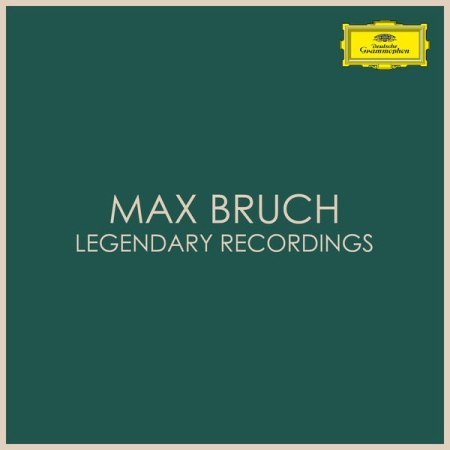VA — Max Bruch — Legendary Recordings (2020)

FLAC (tracks) / MP3 320 kbps | Classical | 2h 56 min | 784 / 405 MB
While the music of Max Bruch generally strikes listeners as beautiful, imaginative, and high-minded, critics have tended to relegate him to the status of a minor master. Bruch started composing as a child, displaying an extraordinary musical talent which was recognized as such by Ignaz Moscheles. In 1852, he wrote a symphony and a string quartet, the latter work brig him a scholarship from the Frankfurt-based Mozart foundation, which enabled him to study with Ferdinand Breunung, Ferdinand Hiller, and Carl Reinecke. In 1858, having embarked on a teaching career in Cologne, he produced his first opera, Scherz, List und Rache. He visited several important German cultural centers between 1861 and 1862. From 1862 to 1864, Bruch lived in Mannheim, where he wrote his cantata, Frithjof, which audiences received with great enthusiasm. In addition, Bruch\’s opera Loreley was produced in 1863. After leaving his Mannheim post, Bruch visited Paris and Brussels, eventually accepting the position of music director in Koblenz in 1865. In 1867, Bruch became Court Kapellmeister in Sonderhausen, remaining at that post until 1870. That year, Bruch moved to Berlin, where his third opera, Hermione, was produced in 1872. Between 1873 and 1878, Bruch, enjoying his reputation as an ent German composer, worked independently in Bonn. In 1881, however, he resumed his career as a conductor, succeeding Julius Benedict as conductor of the Liverpool Philharmonic Society in England, but he did not get along with the players, who had rather lax standards. In 1883 Bruch left Liverpool and became director of the Breslau (now Wroclaw, Poland) Orchesterverein, where he stayed through the end of the season in 1890. That autumn, Bruch took up an appointment as professor of composition at the Berlin Hochschule für Musik, working there until his retirement in 1910 and retaining his rank as a professor there until his death in 1920. During his life he had a reputation as destined to become one of music\’s great composers. Bruch\’s best-known work is without doubt his passionately romantic Violin Concerto No. 1 in G minor (1868), a major item in the standard violin repertoire. His next most often played work is the single-movement work for cello and orchestra, Kol Nidrei. This lovely composition is representative of his interest in setting melodic material originating from other ethnic groups; he wrote works on Russian, Swedish, Scottish, and Celtic melodies as well. These other works, and his symphonies, have not worn well and are rarities, somes revived in the concert hall and on records and on those occasions usually favorably surprising the audience for their beauty and fine workmanship.
[10:30] 1. Pierre Fournier — Bruch: Kol Nidrei, Op. 47
[6:41] 2. Berlin Philharmonic Octet — 1. Andante maestoso — Allegro con brio
[7:27] 3. Berlin Philharmonic Octet — 2. Adagio
[4:32] 4. Berlin Philharmonic Octet — 3. Scherzo. Allegro — Trio. Un poce meno Allegro
[12:19] 5. Berlin Philharmonic Octet — 4. Largo — Allegro vivace
[8:38] 6. Giuseppe Sinopoli — 1. Vorspiel (Allegro moderato)
[9:05] 7. Giuseppe Sinopoli — 2. Adagio
[7:16] 8. Giuseppe Sinopoli — 3. Finale (Allegro eneo)
[4:04] 9. John McCarthy — Bruch: Jubilate, Amen op.3
[8:47] 10. Shlomo Mintz — 1. Vorspiel (Allegro moderato)
[9:39] 11. Shlomo Mintz — 2. Adagio
[7:31] 12. Shlomo Mintz — 3. Finale (Allegro eneo)
[7:58] 13. Erica Morini — 1. Vorspiel (Allegro moderato)
[7:49] 14. Erica Morini — 2. Adagio
[6:59] 15. Erica Morini — 3. Finale (Allegro eneo)
[7:46] 16. Wolfgang Schneiderhan — I. Vorspiel (Allegro moderato)
[8:41] 17. Wolfgang Schneiderhan — II. Adagio
[6:40] 18. Wolfgang Schneiderhan — III. Finale (Allegro eneo)
[10:51] 19. Mischa Maisky — Bruch: Kol Nidrei, Op. 47 — Adagio on Hebrew Melodies for Cello and Orchestra (Adagio ma non troppo)
[8:27] 20. Igor Oïstrakh — 1. Vorspiel (Allegro moderato)
[8:35] 21. Igor Oïstrakh — 2. Adagio
[6:57] 22. Igor Oïstrakh — 3. Finale (Allegro eneo)



